A healthy, well-balanced diet is important during pregnancy. Most fresh foods are completely safe for pregnant women, however, some foods should be avoided during pregnancy or if you’re trying to conceive, because most pregnancies are unplanned. I’ve compiled a list of foods to avoid during pregnancy to serve as a quick guide.
WHY WE SHOULD AVOID THESE FOODS DURING PREGNANCY?
Food may carry germs that can make you sick. Your ability to fight off infections is decreased when you’re pregnant. Food poisoning (Food-Borne Illness) can also affect your unborn baby, such as listeriosis (李斯特菌病), salmonellosis (沙门氏菌病), toxoplasmosis (弓形虫病), campylobacteriosis (弯曲杆菌病). Handling, preparing and storing food properly can reduce the chance of getting sick from food poisoning.
Pregnant women are 10 times more likely than other people to get Listeria infection. Listeria infection can cause miscarriage, stillbirths, and preterm labor (here).
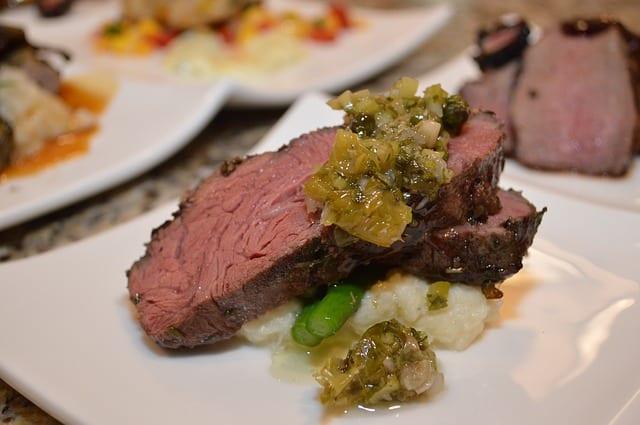
Raw or Undercooked Meat
All meat needs to be thoroughly cooked during pregnancy because of the risk of infection from several bacteria or parasites, including, Salmonella (沙门氏菌), E.Coli (大肠杆菌), Listeria (李斯特菌) and Toxoplasma (弓形虫).
Try to cook meat, poultry and fish to a safe internal temperature and avoid contamination through cutting boards and cooking utensils as well.
- ground beef 71°C (160°F )
- poultry 74°C (165°F)
- Fish 70°C (158°F)
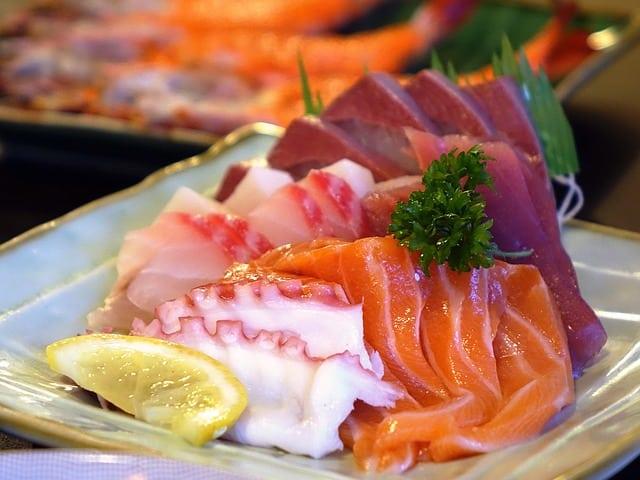
Raw or Undercooked Seafood and Shellfish
Raw or undercooked fish (including sushi, sashimi), especially raw shellfish (raw oysters, mussels and clams), should be avoided during pregnancy because of potentially harmful bacteria (Listeria) and parasites.
Smoked seafoods are safe to eat when they are an ingredient in a cooked meal such as casserole (as it reaches an internal temperature of 74°C (165°F) to kill harmful germs). So, it is safe to eat smoked seafood during pregnancy if it is canned, shelf-stable or an ingredient in a casserole or other cooked dish.
A cooked sushi is fine.
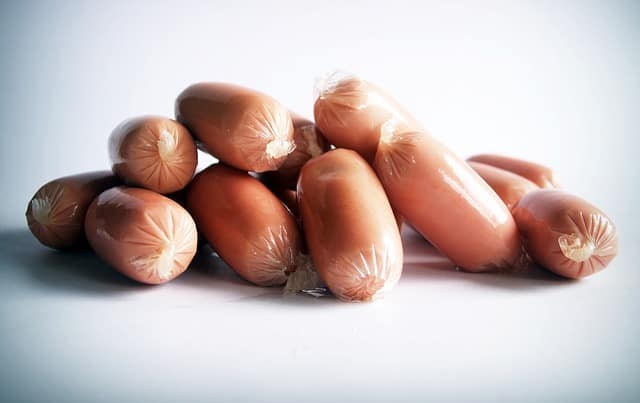
Deli Meats and Hotdogs
It’s advised to avoid all deli meats and hotdogs, if possible, due to potentially contaminate with Listeria. This bacteria can be killed through heat, so if you still want to eat deli meat during pregnancy, be sure to heat the meat until it’s steaming hot, at least 74°C (165°F).
The middle of the hot dog should be steaming hot or 74°C.
Another reason to avoid these foods is the effects of nitrites on a developing fetus are still unknown (deli meats and hotdogs often contain these ingredients).
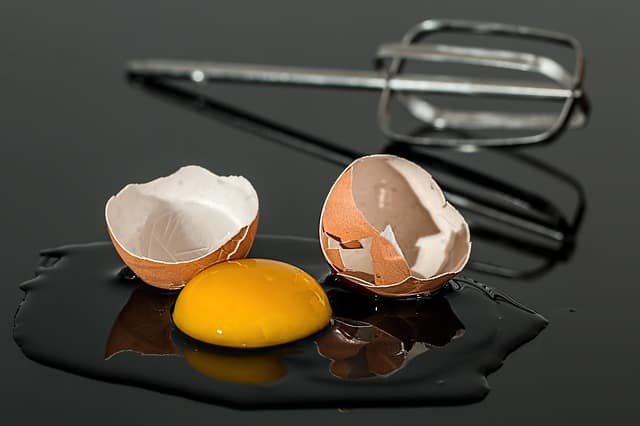
Raw or Undercooked Eggs
Eating raw or undercooked eggs can put pregnant women at an increased risk of Salmonella poisoning. Make sure both the yolk and white are cooked through. Certain sauces, spreads and drinks such as homemade Caesar salad dressing, hollandaise sauce, homemade mayonnaise, unpasteurized eggnog, Tiramisu, custards and homemade ice cream may contain raw eggs.
It is recommended the use of pasteurized egg products when a recipe calls for raw eggs.
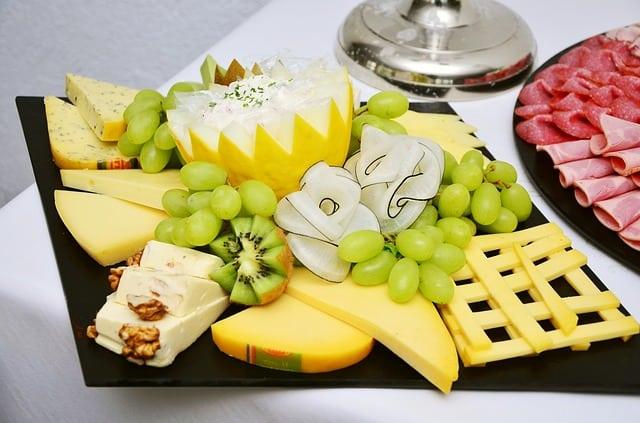
Unpasteurized Dairy Products and Juices
Raw (unpasteurized) milk is milk from any animal (goat, cow, etc) and has not been pasteurized to kill harmful bacteria. Raw milk may contain bacteria such as Campylobacter, E.coli, Listeria, Salmonella, or Toxoplasma. To avoid getting these food borne illnesses, only consume pasteurized milk.
Avoid unpasteurized soft semi-soft, blue-veined cheese such as Feta, Brie, Camembert, havarti, Queso blanco, Queso fresco and Panela unless they’re made with pasteurized milk. These cheese made with unpasteurized milk may contain Campylobacter and Listeria. It is important to read labels carefully, to make sure that the milk being used in these products has been pasteurized. Instead of eating soft cheese, eat hard cheese such as Parmesan, cheddar or Swiss.
Homemade ice cream are made with an egg-based custard that isn’t completely cooked. If you are using pasteurized eggs are okay. Commercially manufactured ice cream is typically fine.
Also, avoid unpasteurized juices such as unpasteurized apple cider. Double check fresh pressed juice and cold pressed juice to be sure. Home-squeezed juices are safe if the vegetables and fruits are washed in cold, running water. I’m a bigger fan of smoothie during pregnancy because you can pack so much more nutrition into them, and you can get the fibre part of the fruits and veggies, not just the juice.
If the cheese is coming in from another country, it may not be pasteurized.
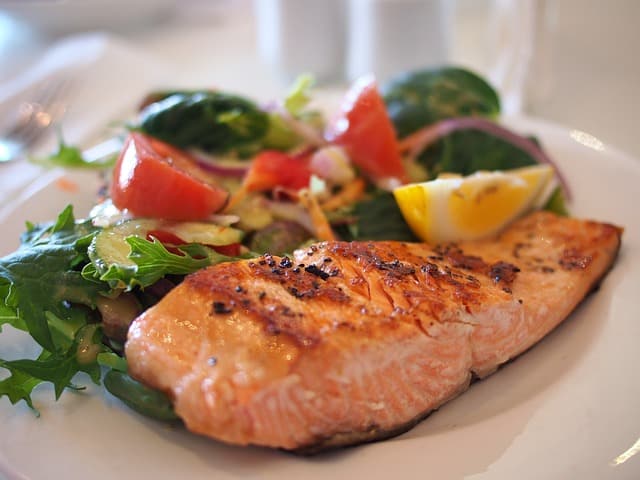
High Mercury Fish
Fish offers many health benefits to both pregnant mothers and their unborn babies. Fish is a good source of protein and healthy fats that help the development of your baby’s brain and eyes.
Eat at least 2 servings of fish per week.
Mercury is toxic to a developing fetus and can linger in a woman’s blood stream for over a year.
Check out FDA Chart
High Mercury Fish:
- swordfish (旗鱼)
- tilefish (方头鱼)
- king mackerel (鲭鱼)
- shark (鲨鱼)
- marlin (马林鱼)
- orange roughy
- canned white tuna (Albacore) (大眼金枪鱼)
Low Mercury Fish:
- salmon (三文鱼)
- trout
- herring (鲱鱼)
- sardines (沙丁鱼)
- pollock (Boston bluefish)
- sole (鳎目鱼)
- flounder
- anchovy (凤尾鱼)
- char
- hake
- mullet
- smelt
- Atlantic mackerel (大西洋马鲛鱼)
- cod
- catfish
- tuna (light canned)/skipjack tuna (罐装金枪鱼)
Raw Sprouts
Raw sprouts including alfalfa, clover, radish or mung bean sprouts may be contaminated with Salmonella or E.coli. According to FDA, cook sprouts thoroughly can kill harmful bacteria and reduce the risk of illness.
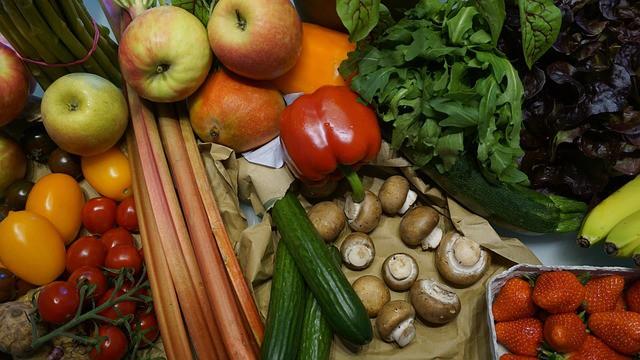
Unwashed Vegetables and Fruit
It’s important to make sure that your vegetables are thoroughly washed to avoid any risk of Toxoplasmosis, because the soil in which vegetables are grown may be contaminated with E.coli or Salmonella.
Eat at least 4-5 servings of vegetables per day and 2-3 servings of fruit per day while pregnant (as well as when you aren’t pregnant). Keep cut vegetables and fruit in the fridge.
Flax Seeds and Flaxseed Oil
Flax seed may adversely affect pregnancy due to its mild extrogenic effects but there is insufficient reliable clinical evidence about the effects of flax seed on pregnancy outcomes (here). There is some evidence about the flaxseed oil is associated with an increased risk of preterm birth. Due to the insufficient evidence, flax seed should be avoided in very large quantities and flaxseed oil should be completely avoided during pregnancy, but it is still safe to consume flax seed in the amounts commonly found in foods, such as flax seed bread.
Artificial Sweeteners
Artificial sweeteners are ingredients that add sweetness to foods. Sweeteners are ingredients in soft drinks, desserts, candies, and pastries. Moderate use of artificial sweeteners during pregnancy is considered safe. It is recommended that pregnant women avoid excessive consumption of products containing artificial sweeteners as such food could replace nutrient dense, energy-yielding foods. So far, Saccharin (Hermesetas®) and Cylamate (Sugar Twin®, Sweet N’Low®) are not safe to use during pregnancy (here).
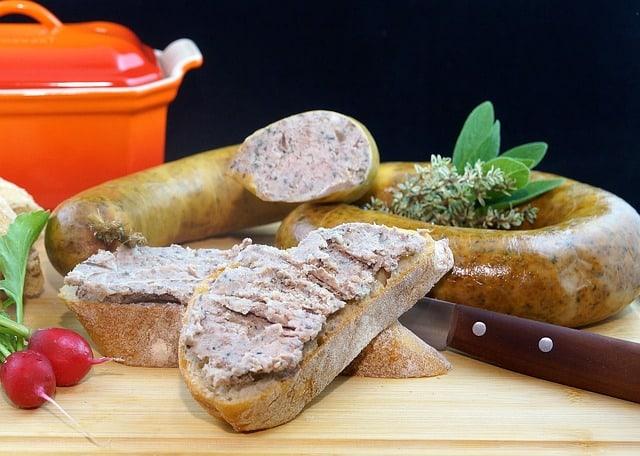
Liver
Liver is rich source of iron. However, it contains a high level of Vitamin A. Large amounts of Vitamin A can be harmful to the baby (here).
Limit liver to 75g (2.5 oz) every two weeks.

Alcohol
Drinking alcohol can be harmful to the baby. No one knows what level of alcohol is safe for an unborn baby.
While you’re pregnant, or thinking about becoming pregnant, it’s safest not to drink any alcohol.
Alcohol is passed from the mom through the placenta to the growing baby. Baby’s liver is not capable of breaking down alcohol, increasing the risk of miscarriage, preterm labor, low birth weight, and Fetal Alcohol Spectrum Disorder (FASD) that can lead to growth problems, development delays, learning disabilities, and deformed facial features.
Alcohol used in cooking, such as Chinese rice wine, may be safe to consume if the food has been simmered or baked for at least an hour.

Caffeine
Caffeine has been associated with miscarriage, especially during the first trimester. However, small amounts of caffeine during pregnancy are fine for most people.
Limit your caffeine intake to about 300 mg per day or less (no more than 500 mL or 2 cups).
High caffeine intake during pregnancy has been shown to increase the risk of low birth weight and impaired fetal growth. Caffeine is also found in tea (green and black teas contain about 30-50 mg per 250 mL or 1 cup), cola (23-40 mg per 250 mL or 1 cup), and chocolate (3-50 mg per 1 bar).
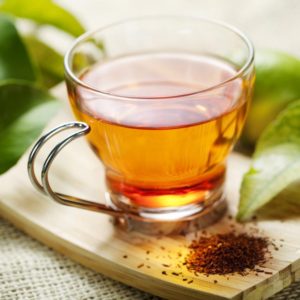
Herbal Teas
You may be thinking you should switch to herbal tea if you’re trying to cut back on caffeine, but that may not necessarily be your best pregnancy drink. Herbal teas can be made with fresh or dried flowers, leaves, seeds and/or roots.
Even though tea is all “natural”, the research on herbal tea is sparse and in some cases, there is concern that if consumed in excess, it could be problematic for a wide range of reasons. Some herbal products may stimulate uterine contractions, or increase the risk of birth defects. Again, it’s likely just a concern if you’re drinking large amounts daily, but always speak to your doctor first before making anything a regular part of your routine. (here, here).
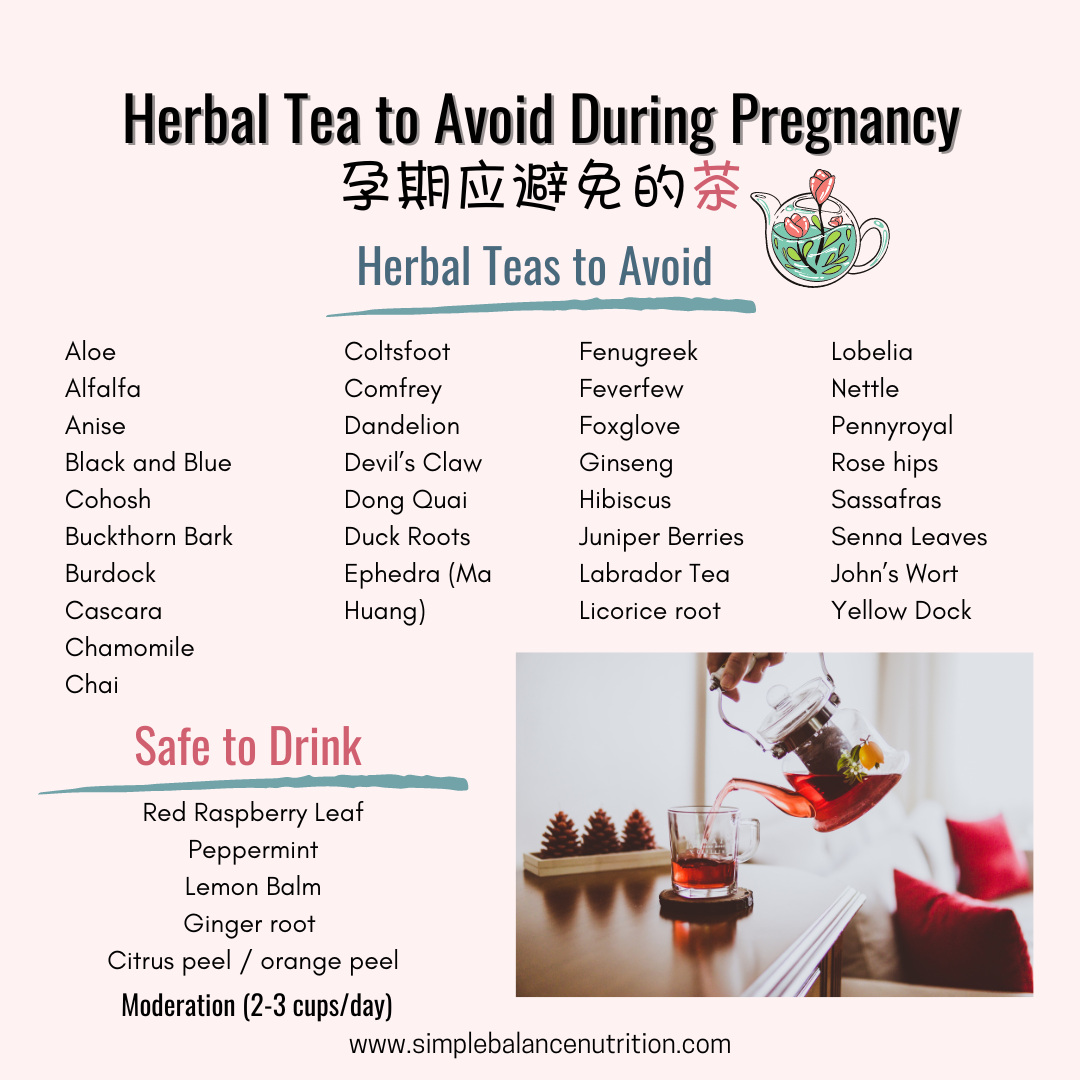
BOTTOM LINE
Although there are foods to limit or avoid during pregnancy, the most important consideration is providing a nutritious prenatal diet.
Information adapted from Food Safety for Pregnant Women

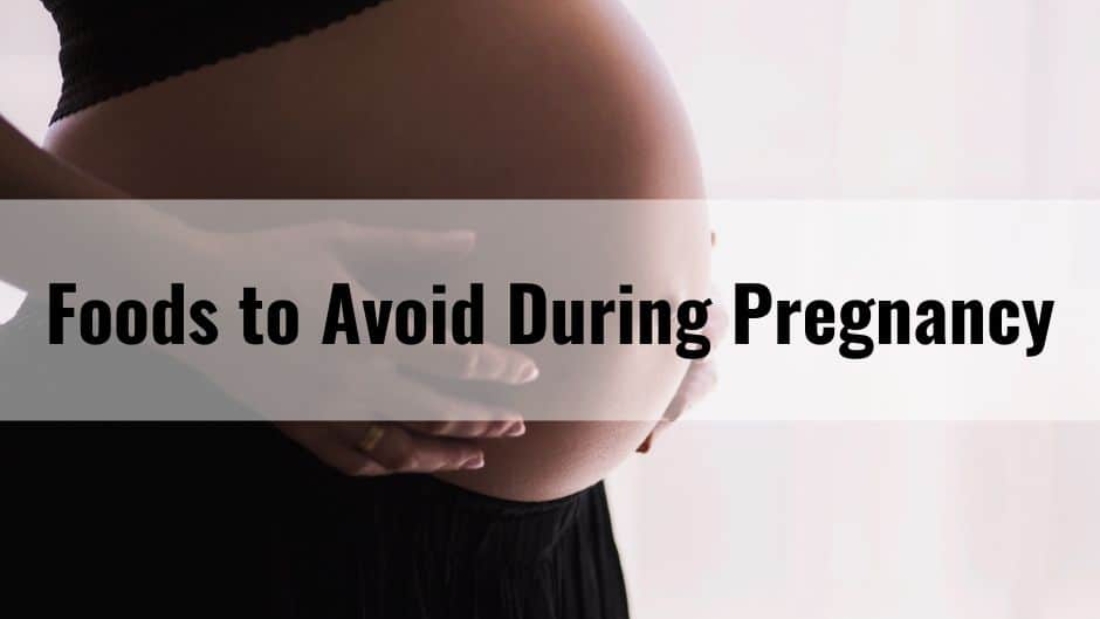
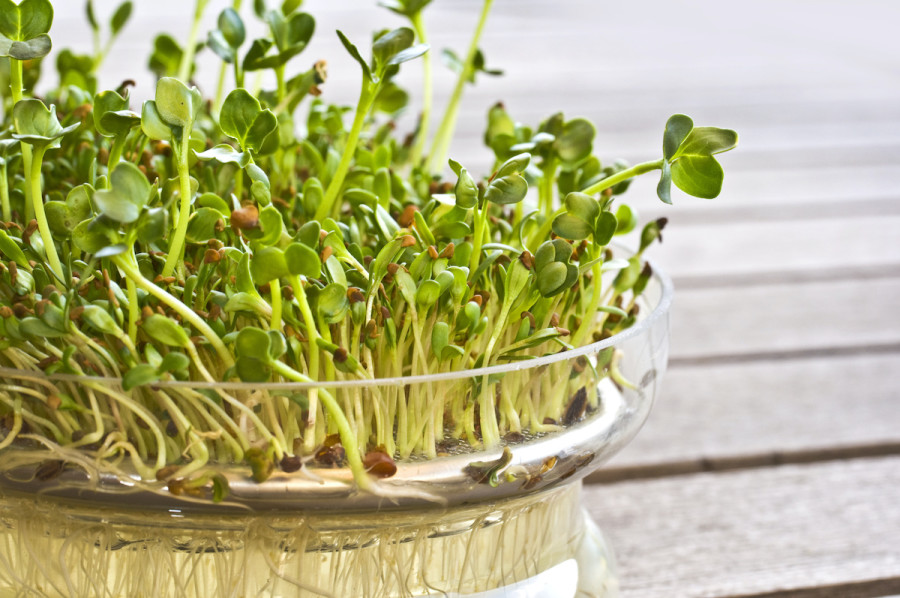
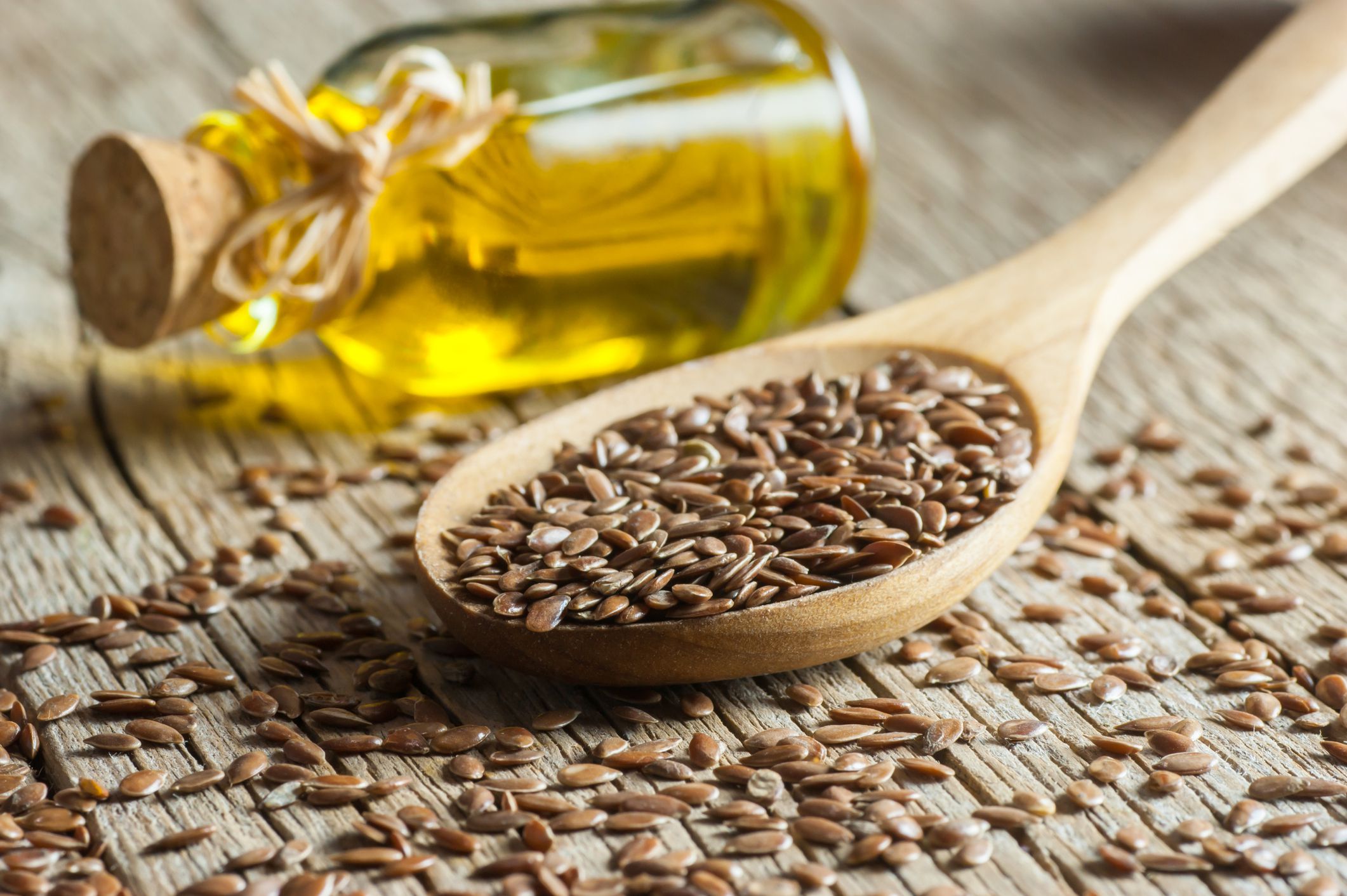
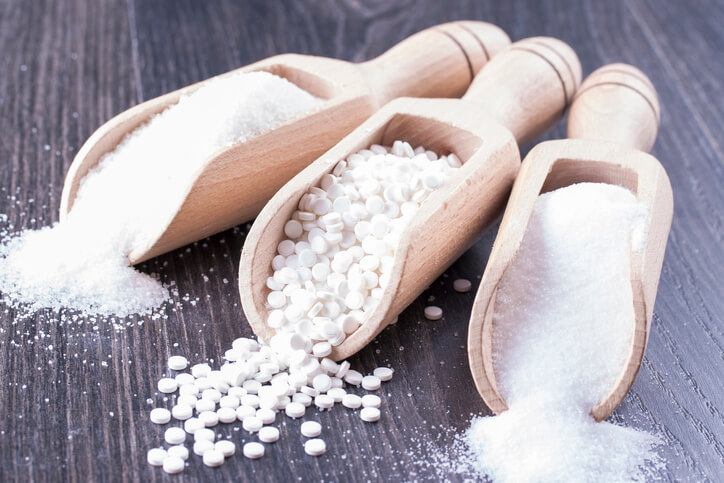
[…] Avoid foods which may be contaminated by bacteria. […]